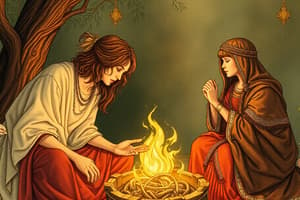Podcast
Questions and Answers
The narrator is eagerly looking forward to going to school.
The narrator is eagerly looking forward to going to school.
False (B)
Big Joe is described as always happy and laughing.
Big Joe is described as always happy and laughing.
True (A)
Charlie is three years younger than the narrator.
Charlie is three years younger than the narrator.
False (B)
The narrator wants to make tonight a memorable night.
The narrator wants to make tonight a memorable night.
Mr. Munnings is portrayed as a kind teacher.
Mr. Munnings is portrayed as a kind teacher.
The narrator believes that going to school is a new and exciting opportunity.
The narrator believes that going to school is a new and exciting opportunity.
The narrator's boots feel light and comfortable.
The narrator's boots feel light and comfortable.
Charlie's knowledge and strength provide comfort to the narrator.
Charlie's knowledge and strength provide comfort to the narrator.
The narrator feels excited about going to school.
The narrator feels excited about going to school.
Big Joe spends his day in a tree singing 'Oranges and Lemons.'
Big Joe spends his day in a tree singing 'Oranges and Lemons.'
The term 'raucous' implies that the crow has a soft and gentle communication style.
The term 'raucous' implies that the crow has a soft and gentle communication style.
The narrator is nearly eighteen years old.
The narrator is nearly eighteen years old.
The narrator describes their boots and heart as light.
The narrator describes their boots and heart as light.
The narrator intends to waste the night.
The narrator intends to waste the night.
The narrator fears the cane used by Mr. Munnings.
The narrator fears the cane used by Mr. Munnings.
The narrator believes that Charlie has told them positive things about school.
The narrator believes that Charlie has told them positive things about school.
The narrator felt sorry for the dead crow hanging from the fence.
The narrator felt sorry for the dead crow hanging from the fence.
The narrator wanted to take the robin's eggs for his collection.
The narrator wanted to take the robin's eggs for his collection.
Father's items were placed in the earth without any ceremony.
Father's items were placed in the earth without any ceremony.
Big Joe is mentioned as being actively involved in taking care of the narrator's eggs.
Big Joe is mentioned as being actively involved in taking care of the narrator's eggs.
The narrator’s gloves were a reminder of his father's death.
The narrator’s gloves were a reminder of his father's death.
The narrator recalls feeling confident about taking the eggs from the robin.
The narrator recalls feeling confident about taking the eggs from the robin.
The crow’s death was part of a larger conflict between birds.
The crow’s death was part of a larger conflict between birds.
Mother placed a scarf along with Father’s boots in the earth.
Mother placed a scarf along with Father’s boots in the earth.
Flashcards
Choking Collar
Choking Collar
The feeling of being forced into something you don't want to do, like going to school when you'd rather stay home.
Dread
Dread
The narrator's fear and apprehension about attending school, especially because of the strict teacher, Mr. Munnings.
Wishing to be like Big Joe
Wishing to be like Big Joe
The narrator's wish to be like his happy and free brother, Big Joe, who doesn't have to go to school.
End of the Beginning
End of the Beginning
Signup and view all the flashcards
Piggyback Goodbye
Piggyback Goodbye
Signup and view all the flashcards
End of Freedom
End of Freedom
Signup and view all the flashcards
Remembering the Past
Remembering the Past
Signup and view all the flashcards
Feeling Alive
Feeling Alive
Signup and view all the flashcards
How old is the narrator?
How old is the narrator?
Signup and view all the flashcards
What two things are described as heavy?
What two things are described as heavy?
Signup and view all the flashcards
What does Big Joe do all day?
What does Big Joe do all day?
Signup and view all the flashcards
What won't the narrator waste?
What won't the narrator waste?
Signup and view all the flashcards
Why is the narrator apprehensive about going to school?
Why is the narrator apprehensive about going to school?
Signup and view all the flashcards
How does the crow communicate?
How does the crow communicate?
Signup and view all the flashcards
What do the heavy boots and heavy heart symbolize?
What do the heavy boots and heavy heart symbolize?
Signup and view all the flashcards
How does the author create mystery?
How does the author create mystery?
Signup and view all the flashcards
What is the narrator’s secret?
What is the narrator’s secret?
Signup and view all the flashcards
What is Big Joe's personality?
What is Big Joe's personality?
Signup and view all the flashcards
Why does the narrator wish to be like Big Joe?
Why does the narrator wish to be like Big Joe?
Signup and view all the flashcards
Study Notes
Summary of the Text
- The narrator, a young boy, is apprehensive about going to school.
- He feels burdened by the prospect of school, and he describes his heavy boots and heavy heart.
- His friend Big Joe doesn't go to school but is happy at home singing and laughing.
- The narrator wishes he could stay home too.
- He reflects on the fleeting nature of time.
- He observes a dead crow and remembers his robin's eggs, and Father's belongings.
- He feels a sense of loss and the end of his carefree childhood.
- The text describes the narrator's emotional state and foreshadows future events.
Questions and Answers
-
How old is the narrator?
- Nearly eighteen.
-
What two things does the narrator describe as heavy?
- His boots and his heart.
-
What does Big Joe do all day?
- He sits in a tree singing "Oranges and Lemons."
-
What won't the narrator waste?
- The night.
-
Describe the meaning of the words:
-
Fleeting: Lasting for a very short time.
-
Raging: Showing rage or with great force and intensity.
-
Reprieve: To cancel or postpone the punishment of someone.
-
Carefree: Free from anxiety and responsibility.
-
Why is the narrator apprehensive about going to school?
- His friend Charlie has said the school is a terrible place.
- Mr. Munnings is a cruel teacher with a whipping cane.
-
What was the robin doing?
- The robin was sitting under a bush, pleading with the narrator not to take her eggs.
-
Look at the phrase, 'his raucous tune scarcely begun'. What does this tell you about how the crow communicates?
- The crow died, before its loud harsh song began.
-
How does the author create mystery towards the end of the story?
- The author mentions the father's presence in the bird's eyes, and revealing the narrator knows a secret they can't tell.
-
Using evidence from the text, explain what you think the narrator could never tell?
- The narrator couldn't tell others about the secret the robin requested, or the feelings surrounding his father's belongings.
Studying That Suits You
Use AI to generate personalized quizzes and flashcards to suit your learning preferences.




